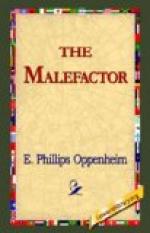“Where is Aynesworth?”
“Looking for work, I think,” she answered.
“Why did you not stay down in Cornwall?”
“Miss Pengarth was away—and I preferred to return to London,” she told him quietly.
“When are you going to marry Aynesworth?” he asked.
She looked down into her glass and was silent. He leaned a little towards her.
“Perhaps,” he remarked quietly, “you are already married?”
Still she was silent. He saw the tears forced back from her eyes. He heard the sob break in her throat. Yet he said nothing. He only waited. At last she spoke.
“Nothing is settled yet,” she said, still without looking at him.
“I see no reason,” he said calmly, “why, until that time, you should refuse to accept your allowance from Mr. Pengarth.”
“I cannot take any more of your money,” she answered. “It was a mistake from the first, but I was foolish. I did not understand.”
His lip curled with scorn.
“You are one of those,” he said, “who, as a child, were wise, but as a young woman with a little knowledge, become—a prig. What harm is my money likely to do you? I may be the Devil himself, but my gold is not tainted. For the rest, granted that I am at war with the world, I do not number children amongst my enemies.”
She raised her eyes then, and looked him in the face.
“I am not afraid of you,” she declared. “It is not that; but I have been dependent long enough. I will keep myself—or starve.”
He shrugged his shoulders and paid the bill.
“My man,” he said, “will take you wherever you like. I have a call to make close here.”
They stood upon the pavement. She held out her hand a little timidly. Her eyes were soft and wistful.
“Goodbye, guardian,” she said. “Thank you very much for my lunch.”
“Ah!” he said gravely, “if you would let me always call myself that!”
She got into the car without a word. Wingrave walked straight back to his own house. Several people were waiting in the entrance hall, and the visitors’ book was open upon the porter’s desk. He walked through, looking neither to the right nor the left, crossed the great library, with its curved roof, its floor of cedar wood, and its wonderful stained-glass windows, and entered a smaller room beyond—his absolute and impenetrable sanctum. He rang the bell for his servant.
“Morrison,” he said, “if you allow me to be disturbed by any living person, on any pretense whatever, until I ring, you lose your place. Do you understand?”
“Perfectly, sir.”
Wingrave locked the door. The next hour belonged to himself alone . . .
When at last he rang the bell, he gave Morrison a note.
“This is to be delivered at once,” he said.
The man bowed and withdrew. Wingrave, with his hands behind him, strolled out into the library. In a remote corner, a small spectacled person was busy writing at a table. Wingrave crossed the room and stood before him.




